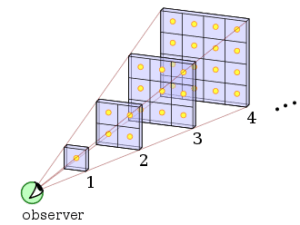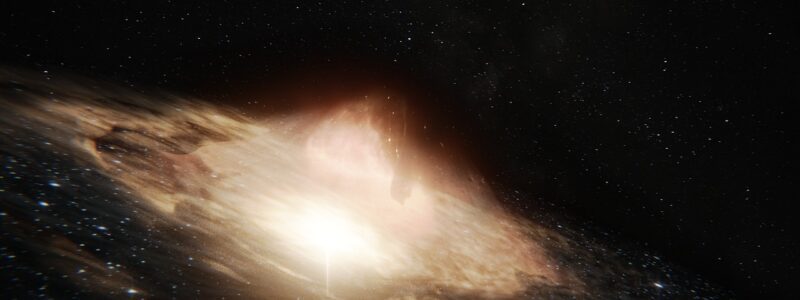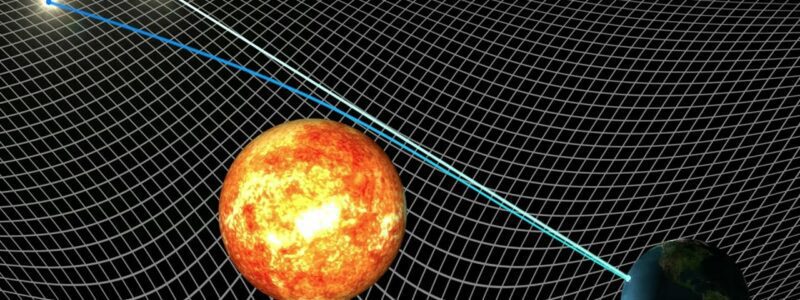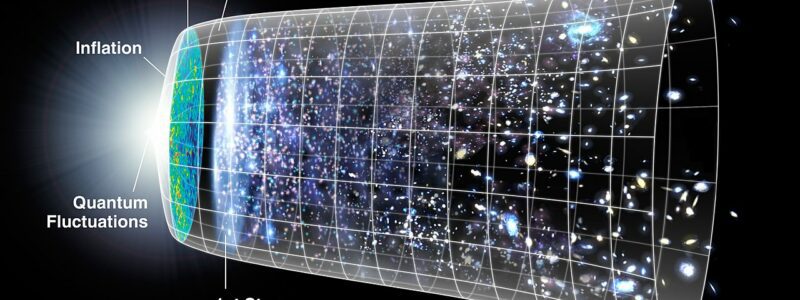Paradox of the Dark Night Sky
The paradox of the dark night sky refers to the simple idea that if the universe were infinite in extent in every direction, then the night sky should appear bright – even brilliant. This is because there should be an infinite number of stars in every bit of space in the sky you are watching. The fact we do not see a bright sky is called “Olbers’ Paradox.”
You go out at night after the moon has set and gaze upwards into the dark night sky punctuated by tiny dots of light such as from stars and planets.

Edgar Allen Poe – By unknown author.
But why does it get dark when the sun sets if the universe is infinitely large? Interestingly, this paradox has interested scientists over the past several hundred years ranging from Kepler (who discovered the laws of planetary motion) to Halley (of Halley comet fame). Even non-scientists such as Edgar Allen Poe have pondered the mystery of this question and have offered a possible resolution to this paradox. Poe published his thoughts in his last major work Eureka stating,
Were the succession of stars endless, then the background of the sky would present us a uniform luminosity, like that displayed by the Galaxy – since there could be absolutely no point, in all that background, at which would not exist a star. The only mode, therefore, in which, under such a state of affairs, we could comprehend the voids which our telescopes find in innumerable directions, would be by supposing the distance of the invisible background so immense that no ray from it has yet been able to reach us at all.
To see why this is a paradox at all, consider a forest. If you are in the center of a dense forest and look in each direction all you will are trees with no light intervening. That is because there is a tree at each point in the distance. Similarly, it might be thought that if the universe were infinite in size, there would be a star at every point in the distant sky and the sky should be very bright, and not dark.
Olbers’ Paradox – the Paradox of the Dark Night Sky

Intervening dust clouds might intervene and absorb some of the light; however, they would eventually achieve thermodynamic equilibrium and radiate the same amount of light as they absorbed.
The paradox has been attributed erroneously to a German astronomer Heinrich Wilhelm Olbers but has been noted by multiple other scientists throughout history.
Proposed Resolutions to Olbers Paradox
The most common explanation for Olbers Paradox is that the observable universe is not infinite in size. The resolution states that because the universe has some finite age and some finite size, only a finite number of stars is visible in any given direction.
More recently, another explanation has been offered which has to do with expanding space. In an expanding universe, distant objects are receding from us at ever-increasing velocities. This causes the light from these distant objects to be red-shifted and diminished in brightness by the time we are able to see them.
Summary
Sometimes the most mundane things in our environment can have the most profound importance.
Examples might include photosynthesis whereby plants are able to take carbon dioxide out of the air and using the energy provided by sunlight able to make organic substances. In so doing, plants emit oxygen into the atmosphere which is essential to our continued existence.
Another example of the miraculous in our everyday existence is how all life from the simplest bacteria and viruses up through plants, organic waste, and animals is organized into an ecosystem that can sustain itself indefinitely.
The fact that the sky is dark and not lit up like the sun has significant meaning concerning the universe in which we live. The fact that the universe is not infinite in space or time has tremendous theological implications which only now is more thoroughly understood.




